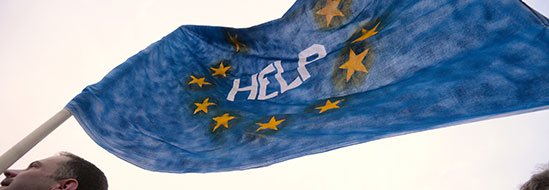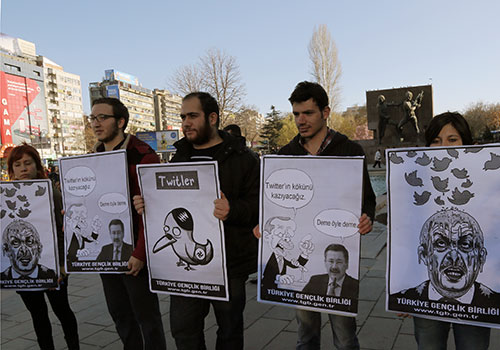How Turkey backtracked on accession responsibilities
Press freedom was not a prominent issue during discussions on Turkey becoming a candidate country in 2005. In part, this was because reform was in the air in Ankara: Recep Tayyip Erdoğan’s Islamist Justice and Development Party (AKP) adopted a number of reforms that appeared to demonstrate its commitment to the Copenhagen criteria. From 2008 onwards, however, Turkey started backtracking.

As well as the threat of imprisonment, CPJ has documented how critical journalists have been harassed, insult laws have been used to silence independent news outlets, and social networks such as Twitter and Facebook are forced to suspend services and remove content in times of political uncertainty. After Turkey became the world’s largest jailer of journalists—CPJ’s 2012 prison census found at least 49 journalists imprisoned at the height of the crackdown—and introduced repressive actions that targeted press freedom, the EU protested more loudly.
In a speech at Istanbul Bilgi University in September 2014 Kroes, then vice-president of the European Commission Digital Agenda, condemned Turkey’s “troubling trends” on free speech and free media. Pier Luigi Parcu, director of the European Commission-funded Centre for Media Pluralism and Media Freedom, was more blunt. In a statement posted on the European University Institute website in December 2014, he said: “The Turkish government should remember that no state that jails journalists can join the European Union.”

The European Parliament’s powerful Foreign Affairs Committee stressed in Brussels in May 2015 that the Turkish government must guarantee press freedom. And in a report adopted in June 2015, the European Parliament’s rapporteur for Turkey, Dutch Socialist MEP Piri, found that the government’s repressive action against the press “conflicts with the spirit of the negotiation process.”
However, the EU’s leverage is weakened by the perception that Turkey will never be part of the EU. Some, favorable to a swift accession to the EU, blame opposition from member states and political parties allegedly wary of including a big Muslim country or a country with an increasingly authoritarian government. Others, suspicious of the AKP’s conservative and nationalist agenda, claim Erdoğan has grown wary of joining the EU because membership, which requires adherence to the EU Charter of Fundamental Rights, contradicts his political ambitions. Turkey, as prominent Turkish journalist Yavuz Baydar underlined in a February 2015 discussion paper for the Shorenstein Center on Media, Politics and Public Policy, “has refused to open the negotiation chapters (on public procurement or competition) related to the problems surrounding journalism and the media industry” i.e. the chapters that would force the government to cut links with servile media moguls.
“The EU margin of maneuver is dramatically limited as its capacity to defend press freedom can no longer use the prospect of membership as a lever,” Carnegie Europe visiting scholar and former EU ambassador Marc Pierini, author of “Press Freedom in Turkey,” told CPJ. Although Erdoğan’s party lost its majority in June 2015 parliamentary elections, the pro-EU constituency, the liberal urban sector that sees EU membership as a political project and not just an economic opportunity, remains a minority and is on the defensive. “It is essential that the EU maintain its emphasis on freedom and independence of the media as a key barometer of Turkish democracy. It is also of vital importance that the EU provides greater resources in support of media independence and help develop new business models for alternative media, particularly in the digital domain,” said Baydar.
Although Turkey has backtracked on its commitments, many observers are convinced that Turkey’s elite is determined to join the EU and that the EU therefore still has leverage that could force authorities to halt their onslaught on the press. Until all the chapters on which accession are based have met the required standards, Turkey will be barred from membership. And, as a final precaution, any member state can refuse to ratify the final stage of accession.
Brussels appears determined to engage with Turkey’s reformists and progressives, even if in doing so, it places them in the line of fire of a government that sees any dissident voice as unpatriotic. The EU seems convinced that it can only accept a Turkey freed, as Ahmet Inselwrote in a 2015 essay, from nationalism and the AKP’s “myth of a conservative Muslim restoration,” both of which restrict press freedom and are anathema to the EU’s proclaimed fundamental values. The risk that realpolitik will interfere with the EU’s proclaimed press freedom and human rights agenda however, has not disappeared. Such a policy of accommodation would leave independent journalists and press freedom advocates isolated and vulnerable.